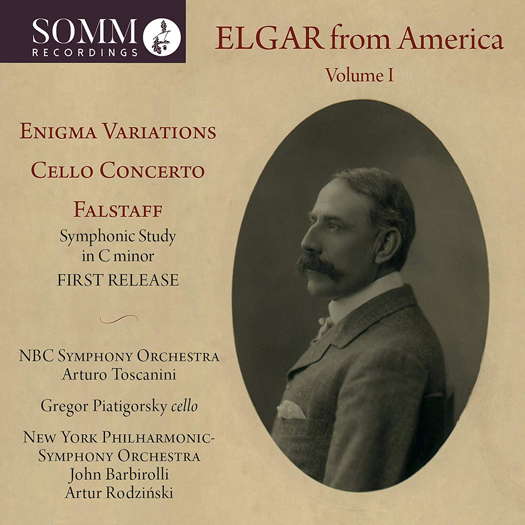 WORD SEARCH: Can you solve Allan Rae's classical music word search puzzles? We're currently publishing one per month.
WORD SEARCH: Can you solve Allan Rae's classical music word search puzzles? We're currently publishing one per month.

A Fine Start
American recordings of Elgar,
heard by GERALD FENECH
'... considering today's technological excellence, this issue is strictly for collectors with a nostalgia for the past.'
Although, in the world of music, Edward Elgar (1857-1934) is now a household name both in England and beyond, it was only in 1899, after he composed the famous Enigma Variations, that he started to be taken seriously. By that time he was already forty-two years old, and it seemed that he was destined for a protracted career, but his precocious talent allowed him to reach the very top of his art, and by the time of his death in 1934, he was one of the most loved composers of his day. Indeed, the last thirty or so years of his life were filled with trips outside England, and the country that welcomed him most was America.
Elgar made four tours of the States - in 1905, 1906, 1907 and 1911, but strangely enough he was never at ease in this 'unlovely place' as he described it, but the chance to make some really good money always lured him back. As can be surmised, he gave many concerts there, but none of them were ever recorded.
This first SOMM volume is all about what happened after Elgar's death. The programme chosen includes three of Elgar's best loved works. By far the most popular of the composer's pieces in America was the Enigma Variations, and it still is. Arturo Toscanini was an avid admirer of the 'Enigma', and, luckily enough, five recorded NBC broadcasts with the great maestro conducting have survived. Unfortunately, despite the familiarity with the piece and a top-notch orchestra, three of the five have egregious mistakes. However, here we have the pristine, error-free performance of 5 November 1949, previously unissued on CD. A full-blooded interpretation this, where Toscanini squeezes all the beauty from this orchestral showpiece.
Listen — Elgar: Nimrod (Enigma Variations)
(track 10, 1:58-2:52) © 2019 SOMM Recordings :
The Cello Concerto had its American premiere in 1922, but after that performance, the work was almost forgotten. The version on this CD is the second of two interpretations by the world-renowned cellist Gregor Piatigorsky, taped during a concert at Carnegie Hall, New York on 10 November 1940. The New York Philharmonic was conducted by none other than Sir John Barbirolli. Thankfully, Piatigorsky's playing is sensitive, sensuous and intense, as this is the only known recording that exists of him playing this concerto.
Listen — Elgar: Adagio (Cello Concerto)
(track 18, 2:45-3:44) © 2019 SOMM Recordings :
Recorded at a live concert at Carnegie Hall on 10 October 1943, the Falstaff on this CD leaves one wondering why Artur Rodzinski chose this work for his inaugural performance as Permanent Conductor of the New York Philharmonic Symphony Orchestra. This was a piece back then that was almost unknown by many concert goers, and preparing for it was a herculean task, as there were no benchmark recordings. One wonders if Rodzinski himself was 'up to snuff' - imagine the audience. It is this unique performance, albeit in a cut version, that is presented here.
Listen — Elgar: The death of Falstaff
(track 25, 5:50-6:49) © 2019 SOMM Recordings :
This is a fine start to this historic cycle, but considering today's technological excellence, this issue is strictly for collectors with a nostalgia for the past.
Copyright © 12 June 2019
Gerald Fenech,
Gzira, Malta




